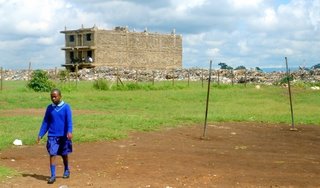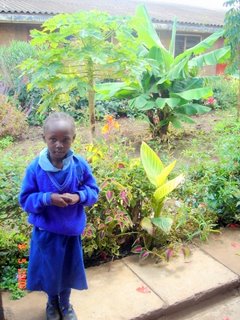
A Backdrop to Education
My colleague Sara Bureti and I visited Wangu Primary School today in Dandora, part of the Muthare Slums of Nairobi. We had with us four Americans from Wahalla, Washington, interested in using their apple business to support education.
The pungent smells of stagnant sewage and rotting waste permeated every corner of the school, as a result of the city dump a stone throw’s away from the school grounds. I had walked through a city dump before in Managua, Nicaragua, and yet could not imagine a public primary school being so close to this filth.
With a radius of over 5 km and growing, the Nairobi dump continues to expand and encroach upon school grounds. People bring their cattle and pigs to feed at the dump, and many wander onto school grounds. During break times, students jostle with cattle and pigs for space to play.
People throw trash onto school grounds, and the innocent little ones often eat the toxic substances. The stench affects the ability of students to learn, leading to numerous headaches and respiratory problems. Hearing all this, I look out to the hills of trash not 50 yards off, where men and storks alike rummage the heaps, living as scavengers.

Window of Opportunity: drug deals are still made through the barbwire fence.
The city dump is a hideout for Nairobi’s most notorious and violent criminals. Formally an estate, the dump and its residents have taken over all the land and the stripped what remains of dilapidated structures. Many use the school as a place to sell drugs, and parents have been known to even use their children to make drug deals on school grounds.
The school would like to see the dump abolished, restricted and perhaps moved to the airport. Yet for many the dump is a source of livelihood, however meager. Some parents are involved in collecting various items from the trash heaps and reselling them in the neighborhood. Many children are orphans and live in houses made of weak mud walls, notes one Primary Seven student Elija Orau, where a thief can come and say, “Open the door or I enter.”
A teacher who had been there ten years said that before the fence was put in with SSZ funds, they would have to close school for two hours, sometimes making the children stay low in the classrooms as gangs clashed within the school’s parade grounds. With the improved security, they are now able to continue with classes uninterrupted.
Headmaster Christine used to assign teachers to take home the office phone and return it in the morning due to the high crime rate. She could not even leave a textbook on her desk without it being stolen that night. Now she keeps a computer in her office, no longer worried about criminals invading the school.

Barriers of Safety and Resentment
The local head of security is very friendly and places the protection of the school in utmost priority. The parents have also been impressed with the strong gate and have agreed with the school to not exacerbate school vandalism. Nonetheless, they know that the chokoras or “street children” are part of the community; thereby a part of the problem and must be incorporated into a sustainable solution. By talking to them and exchanging the needs of each, they are able to create a safe learning environment while not restricting access to the people’s need to make a living; however dismal.
The school has received many tonnes of rations from USAID but is unable to raise funds ($5000) for a kitchen to cook the food. Many parents contributed 50 Kshs (65 cents) each to build a temporary kitchen, but the facilities are inadequate for the 2,000+ students.
 However, as the headmistress notes, “As long as we say, ‘Here, take, take,’ they will never have ownership. If they don’t own it, they won’t sustain it.” A great example of program ownership has been the school’s gardens. The students planted and water the gardens, which are doing remarkably well even after a prolonged dry spell. Not only will the trees and bushes beautify school grounds, but hopefully they will purify the air as well, says “Mr. Green,” the teacher in charge of the project.
However, as the headmistress notes, “As long as we say, ‘Here, take, take,’ they will never have ownership. If they don’t own it, they won’t sustain it.” A great example of program ownership has been the school’s gardens. The students planted and water the gardens, which are doing remarkably well even after a prolonged dry spell. Not only will the trees and bushes beautify school grounds, but hopefully they will purify the air as well, says “Mr. Green,” the teacher in charge of the project. Students, teachers and parents all persevere through dismal circumstances in hopes of a brighter tomorrow, when they can move from the dump to a better place. Until that day, they are resolute to be moral and upright persons, serving as role models for the school as well as the community.
Students, teachers and parents all persevere through dismal circumstances in hopes of a brighter tomorrow, when they can move from the dump to a better place. Until that day, they are resolute to be moral and upright persons, serving as role models for the school as well as the community.

No comments:
Post a Comment